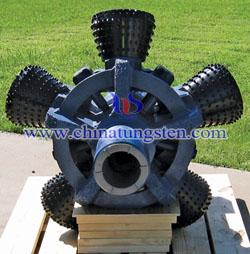Tungsten Carbide Tri-cone Bits for A Solid Bore
- Details
- Category: Tungsten's News
- Published on Monday, 16 December 2013 14:11
Once upon a time, encountering rock formations during a bore could completely stall an horizontal directional drilling (HDD) operation. Back then, if rock was encountered, bores would be abandoned.
Fast forward to today and a time in which advancements in tooling technology and processes have made rock drilling commonplace and opened a vast market for both HDD contractors and utility service providers.
But even today, the right tools and processes can mean the difference between completing the job and completing it profitably — and there’s a lot of homework to be done before tool selection can begin.
“It’s important to gather as much information as possible about the soil conditions and rock formations along the bore path before you ever start,” says Sharewell HDD president Greg Wilson. He encourages contractors to take core samples, test the hardness of the rock and map formation changes on the bore plan, “so the driller will know when he’ll be entering and leaving different formations,” he says.
Additionally, make sure you have the right rig for the job. For the tooling to work as designed, it must be powered by a drilling rig with enough thrust and torque to turn the tooling properly and cut the hole efficiently. A proper drilling fluid program is also critical, as fluid must be pumped at a higher volume during rock bores in order to both clean the hole and provide the hydraulic power to operate some types of downhole equipment.
 The tungsten carbide tri-cone drill bit is the frontline soldier of the drill string, and no bit is more widely used on rock bores than the tri-cone. Decades of experience have gone into the design of today’s tri-cone bits and several options are available to optimize drilling in different types of rock.
The tungsten carbide tri-cone drill bit is the frontline soldier of the drill string, and no bit is more widely used on rock bores than the tri-cone. Decades of experience have gone into the design of today’s tri-cone bits and several options are available to optimize drilling in different types of rock.
For softer rock formations — 8,000 psi compressive strength and lower — milled tooth bits offer the fastest penetration rates at a lower cost.
For rock formations that are harder than 8,000 psi, a tri-cone bit with tungsten carbide inserts is often the go-to bit. In these extreme conditions, the type of insert is determined by the hardness of the rock.
“The harder the rock, the more conical or rounded the TCI inserts should be,” says Wilson.
Tungsten Carbide Manufacturer & Supplier: Chinatungsten Online - http://www.tungsten-carbide.com.cn
Tel.: 86 592 5129696; Fax: 86 592 5129797
Email: sales@chinatungsten.com
Tungsten & Molybdenum Information Bank: http://i.chinatungsten.com
Tungsten News & Tungsten Prices, 3G Version: http://3g.chinatungsten.com
Molybdenum News & Molybdenum Price: http://news.molybdenum.com.cn



 sales@chinatungsten.com
sales@chinatungsten.com